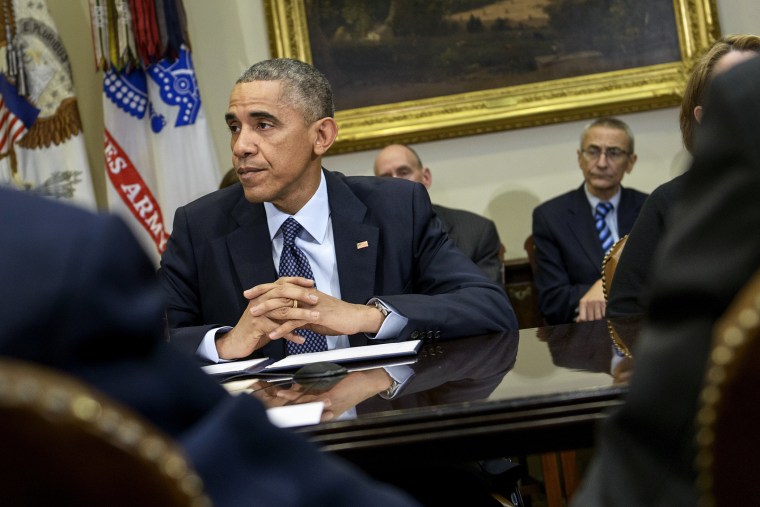The international effort to stamp out Ebola in West Africa is gaining ground, but the war is far from over.
“We are nowhere near out of the woods yet,” President Obama told reporters Tuesday at the White House as he met with national security and public health advisers, including Ebola response coordinator Ron Klain. Obama urged Congress to approve $6.2 billion in emergency funding to fight the disease before lawmakers break for the holidays.
“We cannot be complacent simply because the news attention on it has waned,” he said. “We have to stay with it.”
Though Liberia has seen a recent drop in the number of reported cases, Ebola remains a serious threat throughout the region. The Centers for Disease Control and Prevention (CDC) is responding to as many as one new "cluster" -- defined by the CDC as "two or more confirmed, probable or suspected cases" -- per day in Liberia, said CDC Director Tom Frieden Tuesday, compared to one cluster every year or two over the past four decades.
Meanwhile, Sierra Leone still has areas that are seeing widespread transmission. And the CDC is now responding to a new outbreak in Mali.
RELATED: Ebola aid groups worry about delays and staffing shortfalls
“The metaphor of a forest fire holds here with the center burning still strongly and a series of brush fires around the region, and with sparks that have the potential to ignite new sources and new challenges in the struggle against Ebola,” Frieden told members of the House Energy and Commerce committee Tuesday.
Earlier in the day, humanitarian aid workers made the same case to lawmakers on Capitol Hill. Speaking before the House Subcommittee on Africa, Global Health, Global Human Rights, and International Organizations, representatives from groups on the ground in West Africa laid out the steps that have been taken to successfully slow the disease’s deadly march, and those that are still needed.
Among their recommendations were improving data collection to determine where Ebola Treatment Units (ETUs) should be built, interfacing national and international response efforts with those of local communities, and investing in stronger health care systems to ensure that other illnesses won’t decimate the population like this again.
“We cannot only be reactive,” said Rabih Torbay, senior vice president for international operations at International Medical Corps. “Anytime there’s an outbreak, this is when we decide to train. We need to build a stronger health care system. We need to build a stronger preparedness system in all of these countries. And we need to focus on health workforce development, because, again, it’s not just infectious diseases; it’s the malaria, it’s the safe [child] delivery; it’s diarrhea; it’s vaccine-preventable diseases that children are dying from … This is the sustainability aspect that we’re encouraging all our colleagues to look at. What comes beyond Ebola?”
RELATED: Doctors speak about Ebola death
Tuesday’s hearing follows the death of Dr. Martin Salia, a U.S. resident who was infected with Ebola in his native Sierra Leone before being transferred to Nebraska Medical Center, where he died on Monday. Salia was the 10th Ebola victim to receive treatment in the U.S., and only the second person to die from the disease on American soil.
Eight other people have fully recovered from the disease after receiving treatment in U.S. hospitals.
Another Sierra Leonean doctor died on Tuesday, Reuters reported, bringing to seven the number of doctors who have died as a result of Ebola, and widening the already ample gap between medical providers in the country and sick people. The World Health Organization says that 570 health care workers have been infected during this epidemic -- the worst in history -- and that 324 of them have died.
“Liberia and Sierra Leone, even before Ebola, had very low doctor-per-person ratio,” said Torbay. “We’re talking about one doctor for 100,000 in Liberia, and that’s before 324 health workers have died from Ebola. So you can just imagine the gap.”
To fill that void, the U.S. Africa Command has pledged to train as many as 500 new health care workers a week for at least six months.
Humanitarian groups on the ground have also been working with clergy and community leaders to promote safe burial practices for Ebola victims -- a process that has played a major role in the disease's spread, as bodies are believed to be contagious for weeks after death.
Additionally, American doctors have been traveling back and forth to the affected region since the crisis began. Although a handful of states have imposed mandatory quarantines on returning doctors and nurses, federal health officials have called for less extreme measures -- such as voluntary quarantine and daily monitoring without isolation -- to keep the channels of personnel and resources open.
RELATED: More travel restrictions for West Africa
“If we’re not able to stop the epidemic in West Africa, the risks are very high that it would spread to other parts of Africa,” said Frieden. “If that were to occur, then it could be a matter of many years before we would be able to control it, and the threat to the U.S. and other countries would be proportionately greater.”
